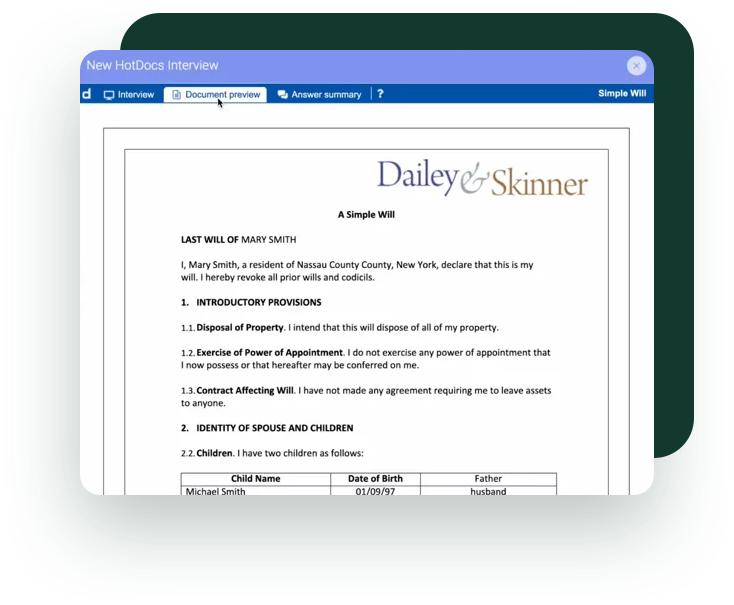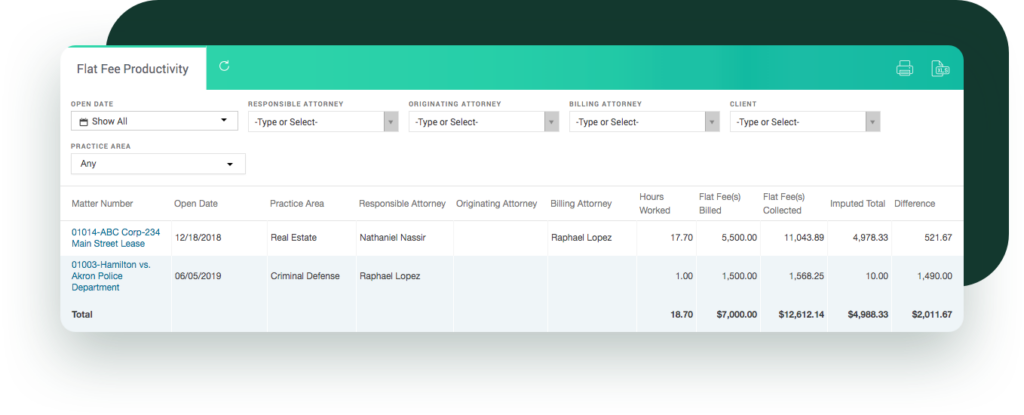Who would have guessed that more than half the energy devoted to effectively managing a law firm has nothing to do with practicing law? According to the 2022 Thomson Reuters report on the State of Small Firms,
The average small firm attorney now spends only 56% of their time practicing law, down from 58% in 2020. While this may seem an insignificant shift, two percentage points represents about 12 minutes per day, or roughly two-tenths of a billable hour. That comes out to nearly 50 hours for a lawyer who’s working 50-hour weeks, 50 weeks per year.
What makes a law firm successful?
Your practice is a professional services organization, but it’s also a business. Contemporary law office management comprises all the business processes that keep the firm operating, including marketing, finance, accounting, human resources, policies, procedures, and workflow management.
Thanks to improvements in communications and new legal practice management software, effectively managing your law office doesn’t have to take up all of your time. With a well-defined focus, the right processes, and the right legal technology, you can run your practice more efficiently and free up hours of time to spend on client engagement and billable activities.
How to manage a small law firm?
From organizational leadership to administrative work and everything in between, effective law firm management is about far more than just practicing law. There’s no one-size-fits-all solution to managing a law firm, but practicing even one of these seven habits will help your firm stand out from the crowd.
Selecting a New Practice Management System
Download this guide to help you select the right technology for your firm, calculate the total cost of ownership, and understand data migration considerations before making a move.

The 7 habits of highly effective law firms
1. Define and communicate your firm’s focus
Focusing on a specific practice area allows potential clients and other attorneys to recognize you as an expert in your practice area. Attorneys with a practice area focus gain valuable experience, knowledge, and a network of contacts that enable them to solve problems faster and provide a higher level of service. Whether your focus is family law, civil litigation, personal injury, or estate planning, every practice area tends to have its own vocabulary and customs and care about different data.
Using a legal practice management system with custom dashboard views allows you to filter matters by practice area and other custom fields so you can dictate exactly what you want to see on your matter dashboard.
2. Provide clear leadership from the top down
In a professional services firm, people are the organization’s greatest assets. As a law firm owner or partner, your role includes motivating employees and communicating the firm’s strategy, direction, and values. The skills needed to be an effective people manager are learned ones. If you’re new to managing staff, seek out CLE courses or an online or university class.
Good leadership also means investing in professional development opportunities for your attorneys (Check out these 5). This might look like offering 1:1 meetings between junior and senior associates, providing funding for courses, or sending employees to conferences.
3. Establish standard operating procedures (SOPs)
The key to keeping a law firm organized is to have a standard set of procedures (SOPs) that are understood and followed by the entire team. SOPs create a practice management “how-to” guide that’s unique to your firm.
Your standard operating procedures will be tailored to the type of law you practice, but they will typically address tasks like:
- legal case management
- new client onboarding
- document automation and management
- appointment scheduling
- document review and approval
- time tracking
- billing and payments
- trial preparation
- archiving client files at the end of an engagement
To develop your SOP, start by documenting and organizing all relevant information. Then, make it accessible to all employees in a searchable, digital format. Include a firm organization chart, all policies and procedures, and a data map for the organization. If you’re struggling to manage your SOPs, a legal practice management software solution can help with automating parts of your workload.
4. Organize and minimize paper with document automation
A paperless law firm is an achievable goal. But realistically, most of us still have to deal with incoming mail and client documents on paper. But, you can digitize as much as possible. By scanning documents into digital formats, they can be stored within the firm’s case management software, shared with clients on a portal site, and archived efficiently. Plus, legal practice management software enables you to create and save templates, so important documents only need to be created once.

Powerful document automation capabilities with HotDocs
5. Use legal technology to your benefit
Technology is changing the legal industry in powerful ways. Outside of document management, organization, and automation, legal practice management technology has become a game-changer for growing law firms.
Simplify your time and billing
If your firm operates on an hourly billing model, a practice management platform with time and billing software capabilities can save you hours each week, allowing your firm to maximize revenue and capture details to help you understand activity and productivity levels.
Upgrade your calendar
Intelligent calendar technology can automatically schedule critical deadlines for a matter based on the applicable federal, state, and/or local court rules. Your firm can save even more time with a system that provides current court forms for your practice area and jurisdiction, reducing the time required to create and file documents.
Increase your referrals
Legal practice management technology can also help generate referrals, giving you and your employees valuable insight into past referrals while managing incoming opportunities in one easy-to-access place.
Work from anywhere
Perhaps the most significant benefit of legal practice management software is seen when it comes to managing remote workers. Secure cloud applications designed specifically for law firms have made remote work significantly easier, and assistance from a cloud-hosting provider or technology consultant can help you put together a comprehensive technology strategy for your firm.
A suitable legal practice management tool will enable your team to collaborate effectively, offering a central hub for managing projects and tasks and connecting your calendar, documents, and emails to client cases. When you’re on the hunt for a practice management platform, be sure to find one that supports your practice area and jurisdiction.
6. Be vigilant with finance and accounting
As with any business, accurate accounting is important for law firms. Timely billing and efficient cash management are key to profitability. Perhaps more importantly, effective accounting is critical for compliance with Rule 1.15 of the ABA’s Model Rules of Professional Conduct, outlining firm responsibilities regarding trust accounts, record-keeping, and notifying clients of the receipt of funds or property.
When combined, automated invoicing and payment processing software help firms everywhere save time, improve efficiency and reduce paper consumption. A good billing and payments solution will process all types of credit cards and e-checks, take payments from trust and operating accounts, and integrate with your practice management system.
7. Track KPIs
Most law firm leaders say they would like to add more clients, increase revenue and improve profitability. To know if your firm is on track in meeting those goals, make it a practice to gather and analyze key performance metrics on a regular basis.

CARET Legal’s Flat Fee Productivity Report
Revenue and client goals are easily measured. Profit, calculated as total revenue minus total expenses for a given period, can be improved on either side of the equation: increase revenue or reduce costs by automating manual tasks.
In addition to measuring profit, analyze utilization rates to ensure that associates and partners are maximizing billable hours. Track income by practice type (or by client) to gain deeper insight into which type of work or client generates the most revenue. These metrics offer insight into your practice and can inform your decisions on a growth strategy for your firm, setting you up for future success.
Improve Employee Engagement and Client Satisfaction
With the right legal technology, your firm can attract employees, reduce turnover and generate more business.

How to make law firm management easier
Entrepreneur and motivational speaker Jim Rohn once said:
“Success is a few simple disciplines repeated every day. Highly successful people learn continuously, anticipate and plan for the future, communicate proactively and are willing to try new things – whether adopting new technology or taking an accounting course – to reach their goals.”
If you have further questions about effective law firm management, including using cloud strategy, information security, integrations, or automated payment technology, give us a call or contact us online. If you want to jump right in, check out our free trial!
